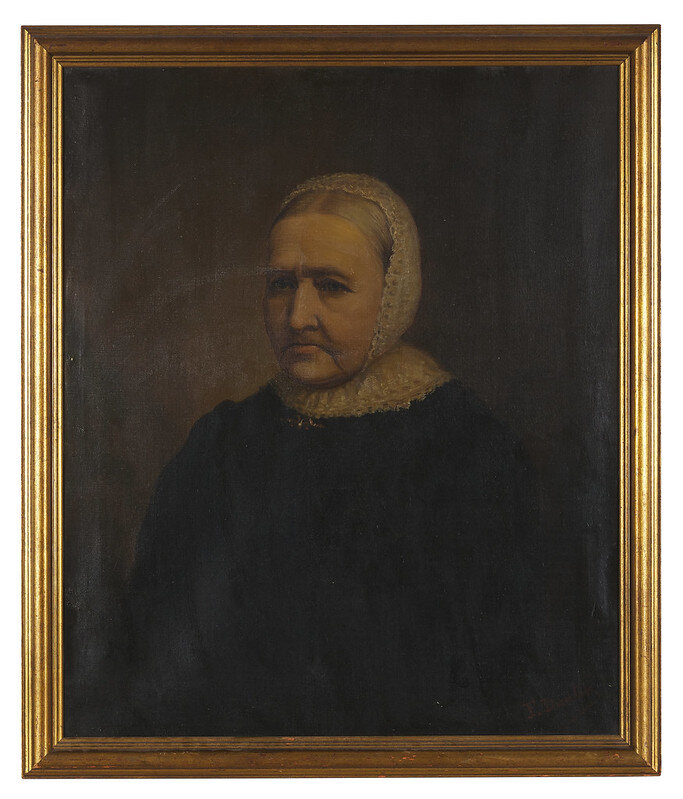Ever since photography became the favored medium of memory, painted family portraits became rare. These portraits are special heirlooms that deserve to be cherished and maintained for generations. A recent client of ours shared this belief and he and his family sent a portrait of their great great-great-grandmother to The Center for treatment.
Before Treatment
The woman in the painting is Marie Elizabetha Brenner (née Schieferdecker), who was born in Heidelberg, Germany, in 1817. She moved to the village of Asbach am Mosbach in northern Bavaria when she married Georg Adam Brenner. After a few years and the birth of their daughter Elizabetha they emigrated to New York City, where the young family lived in the lower East Side of Manhattan, then known as “little Deutschland.” Sometime after the Civil War, the family had portraits painted of individual members. Today, the family is still in possession of portraits of Georg, Elizabetha, Elizabetha’s husband, Georg Pfeiffer, their daughter, Katerina, and of course, the portrait of Marie.
Before Treatment- Detail
The portrait, signed by F. Danton at the lower right, was painted in oil on a linen canvas. Our conservators removed the canvas from the frame for examination and found that the canvas exhibited deformations throughout. Additionally, there was scalloping along the edge of the canvas, which is characteristic of a canvas over its wooden stretcher without adding a sufficient number of tacks to keep the canvas in place. There was debris found between the canvas and stretcher bars that was causing bulges in the painting, and there were mechanical cracks in the paint layer. A discolored, thick layer of natural resin varnish covered the painting, on top of which was a light layer of surface grime.
Before Treatment- Detail of Frame Damage
The frame, made of wood, red bole, and imitation gold leaf, exhibited moderate abrasions, scratches, and dents throughout. There were some minor gilding losses and flaking as well. Since it is thought to be the original frame, it received treatment before being reunited with the painting. The flaking paint gilding was consolidated, and all of the scratches, losses, and abrasions were inpainted to match the surrounding surface. The frame was cleaned and coated with a protective layer of microcrystalline wax.
Before Treatment Under UV Light
Meanwhile, the portrait underwent its own treatment in the Painting Department. Treatment began with the consolidation of any unstable cracking. The debris between the canvas and stretcher bars was removed. Our conservators then worked on flattening the canvas deformations. This was done using a combination of moisture and weight techniques. Once the deformations were reduced, our conservators added additional tacks for appropriate support, replaced a missing key, and adjusted the tension of the canvas.
During Treatment- Varnish Removal
During Treatment- Varnish Removal Under UV Light
Detail of Varnish Removal
After addressing the issues with the support, the painting was surface cleaned. The original discolored varnish was removed to the extent safely possible with organic solvents, minor inpainting was done with reversible conservation paints, Gamblin Conservation Colors, and a new varnish was applied. The painting was reinstalled into the original frame and backed with a Coroplast backing board for additional protection.
Before Treatment
After Treatment
Marie died in Manhattan in 1904 and was buried in a family plot in Queens, yet her memory lives on through generations. Marie’s portrait will be traveling back to Germany to be displayed in the home of her great great-great-great grandson.
Verso Before Treatment
Verso After Treatment












